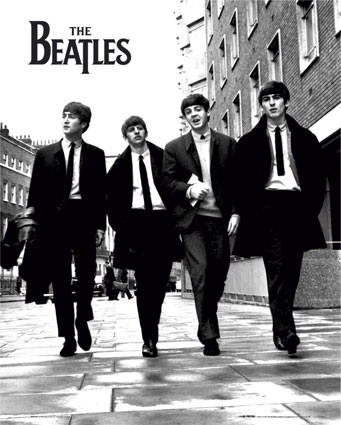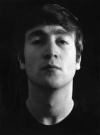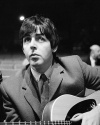The Beatles
(→Help! (1965)) |
(→Help! (1965)) |
||
| Line 145: | Line 145: | ||
Interestingly [[Phil Collins]] had a small role in the film as did Pati Boyd who later went on to be [[George Harrison]]s first wife and later married [[Eric Clapton]].<br> | Interestingly [[Phil Collins]] had a small role in the film as did Pati Boyd who later went on to be [[George Harrison]]s first wife and later married [[Eric Clapton]].<br> | ||
=== Help! (1965) === | === Help! (1965) === | ||
| - | {{#ev:youtube|6M3skID44Gg | + | {{#ev:youtube|6M3skID44Gg}}<br> |
Again directed by Dick Lester this film saw the Beatles looking rather more weary and tired, due in part to their hectic schedule but also the large quantities of dope that they were using at the time. The film is a sort of spoof and was filmed in a style that perhaps influenced later films such as the [[Monkees]] series in USA and also the early Batman series. The Beatles have stated that they did not enjoy the film and it was in fact the last “scripted” film that they made.<br> | Again directed by Dick Lester this film saw the Beatles looking rather more weary and tired, due in part to their hectic schedule but also the large quantities of dope that they were using at the time. The film is a sort of spoof and was filmed in a style that perhaps influenced later films such as the [[Monkees]] series in USA and also the early Batman series. The Beatles have stated that they did not enjoy the film and it was in fact the last “scripted” film that they made.<br> | ||
Revision as of 12:21, 12 October 2009
Contents |
Introduction
The most famous and influential band there has ever been. The Fab Four changed the face not just of popular music and how it is recorded but also were a great influence in the changing of popular culture in the 60’s.
The Beatles were a band formed in the late 1950's that started out playing rock and roll classics but evolved into the most popular pop/rock group of all time. Their recordings have become classics and they have influenced generations of musicians that have followed.
Band Members
John Lennon
Guitar and Vocals
Born 9 October 1940 in Liverpool
John was brought up by his aunt Mimi who was very strict. He had little contact with his father but his mother Julia lived close by. His mother bought him his first guitar in 1957. Mimi did not approve stating “The guitar's all very well, John, but you'll never make a living out of it" !!!
In March of 1957 John formed his first band The Quarrymen, named after his secondary school in Liverpool (Quarry Bank High School). Through this he met both Paul McCartney and George Harrison.
In 1958 his mother was killed when hit by a car outside his home, this had a big effect on John and perhaps helped cement his friendship with McCartney whose mother had died of cancer two years earlier.
During The Beatles years he did of course form half of the Lennon/McCartney songwriting partnership. John was regarded as the founder and leader of the band. What I admire about his songwriting is its honesty, people would often try to read things into his lyrics but in reality his songs were largely about his life. Of course he had a love of words and some of his songs were based around wordplay, "I am the walrus" springs to mind.
John was often a controversial figure, most famously for saying in an interview in 1966 with Maureen Cleave of the London Evening Standard that The Beatles were more popular than Jesus. This was rather misunderstood particularly in USA and upset the bible belt and the ultra christian Ku Klux Klan which organised burnings of Beatle records. The led to threats against the Beatles and was one of the cotributing events which influenced their decision to end touring.
John left the Beatles in 1969 although this was not anounced for some months. He had a major falling out with McCartney at this time which was never really resolved. Post Beatles John worked with his wife Yoko Ono on several music and art projects and campagned for world peace. He produced several solo albums and produced some of his finest songs such as Imagine.
He last performed like in 1976 and then dropped out of music concentrating on becoming a "househusband" and spending time with his young son Sean.
Unfortunately John was murdered on 8 December 1980 outside the Dakota building in New York by Mark Chapman. This happened at a time when John was returning to music having recently released the Double Fantasy album.
Paul McCartney
Born 18 June 1942 in Liverpool
Paul was encouraged to play music from an early age by his father Jim McCartney who was a piano and trumpet player in a jazz band. He started out on trumpet but swapped his trumpet for an acoustic guitar which being left handed he initially found difficult to play.
He met George Harrison in 1954 as both attended The Liverpool Institute (this has now become the Liverpool Institute Of Performing Arts which McCartney helped to set up in 1996).
Whilst in Hamburg with the Beatles Paul reluctantly became the bands bass player and made famous the Hoffner violin bass which he still plays.
Post Beatles he continued to be successful both as a solo artist and as founding member of Wings with guitarist Denny Laine. Following John Lennons death he bacame wary of touring and Wings were disbanded. Since than he has continued to work in music and has collaborated with many other famous artists including Stevie Wonder, Michael Jackson, Elvis Costello. He has also maintained a close working relationship with Sir George Martin and produced classical works.
George Harrison
Born 24 February 1943 in Liverpool
Died 29 November 2001
Guitar and vocals.
Ringo Star
Born 7 July 1940 in Liverpool
Drums and vocals.
The “Fifth” Beatle!
There never was a fifth Beatle, however many people played a significant part in the Beatles story.
Pete Best
Born 24 November 1941 in Madras, India.
Pete was Beatles drummer from August 1960 during next two years. He was the Beatles drummer during their time in Hamburg. He was forced from the band and replaced by Ringo on the eve of them beginning their recording career. Many consider him to be the better drummer but it was felt that his image did not fit the band. For example he had refused to cut his hair in the mop top style adopted by the others whilst in Germany.
Mona Best
Mona Best, was the mother of Pete Best, their early drummer and she ran the Casbah Club, a cellar club Liverpool. It was here that the Beatles played some of their earliest gigs.
Allan Williams
Often overlooked but I feel Allan was important in the development of the Beatles. He was owner of the Jacaranda club in Liverpool where the young Beatles would hang out and play the occasional gig. Allan began acting as their booking agent/manager and is responsible for securing them their work in Hamburg, even accompanying them on their first trip. He fell out with The Beatles on their return from Hamburg as they apparently refused to pay his 10% commission.
He wrote a very interesting book “The Man Who Gave The Beatles Away” about his part in their early years which was endorsed by John Lennon. He organised some of the first “Beatles Conventions” in Liverpool and still attends such functions today as a speaker.
Stu Sutcliffe
Born 23 June 1940 in Edinburgh,
Died 10 April 1962 in Hamburg, Germany from a brain hemmorrhage which was probably caused by a terrible beating he received outside a club in Hamburg.
Stu was a talented artist and a great friend of John Lennon. He was never a good musician but was able to buy a bass guitar with prize money which he won in an art competition. He therefore became their bass guitarist from late 1959 until the Beatles second Hamburg trip in 1961. He was shy and would often stand on stage with his back to the audience to hide his poor playing.
Whilst in Hamburg the Beatles met Astrid Kirshner who became Stu’s girlfriend. She changed his clothes and gave him a new, distinctive hair style, which all the Beatles apart from Pete Best later adopted. The moptop was born!
Brian Epstein
Born 19 September 1934 in Liverpool.
Died 27 August 1967 of an accidental drug overdose in London.
Brian was manager of a large family music store called NEMs in Liverpool. Several stories have been put forward as to how the Beatles came to his attention. One of the most popular is that his curiosity was aroused after a customer asked to buy a copy of the single “My Bonnie” which The Beatles had recorded in Hamburg as backing group for singer Tony Sherridan. More likely he was already aware of them as they were by then regularly playing at the Cavern Club and receiving a lot of local publicity via a local music magazine called MerseyBeat. NEMs would have stocked MerseyBeat. Epstein arranged to see The Beatles play at a lunchtime session at the Cavern Club on 9 November 1961. After watching them several more times he took over as their manager on 24 January 1962. He quickly arranged for them to make a demo recording which he touted around various recod companies in London. He was unsuccessful until EMI gave the Beatles their big break.
Brian Epstein also managed other acts, including Gerry and the Pacemakers, Billy J. Kramer, Cilla Black, the Fourmost, the Big Three, the Remo Four and Tommy Quickly.
George Martin
Born 3 January 1926 in London.
George worked as a record producer for Parlophone (part of EMI) and was the producer of all of the Beatles records except for Let It Be. The Beatles worked with George at Studio 2 in Abbey Road recording studios. He proved to be very adept at capturing the energy of their performances and developed many new recording techniques in order to turn their ideas and raw songs into commercial recordings.
Mal Evans Mal was The Beatles' roadie from the summer of 1963 until the time of The Beatles break up. He was a constant companion of the band both on the road and in the studio. He set up and tested their equipment, acted as chaufer, bodyguard and gofer. Many Beatles autographs now part of the memorabilia market may in fact have been signed by Evans as the Beatles didn’t have time or the inclination to sign all such requests. He also contributed to several of their songs, with backing vocals, sound effects and played hamond organ. Mal died 5 January 1976 after being shot by police in Los Angeles in a misunderstanding about a gun.
History
Formation and Early Years - Pre Fame
1962 – 66 Beatlemania
Later Years and The Breakup Of The Band
After The Beatles
Equipment
John Lennon
During his career with the Beatles and subsequently he used a huge range of guitars. Perhaps his most famous instruments are:- A Gibson J-160E which was one of the first acoustic-electric guitars ever produced
- He had several Rickenbacker 325’s including a 1958 original model with Bigsby tremolo which was nicknamed Hamburg.
- A Gretsch 6120 which was used on the Revolver sessions.
Paul Macartney
George Harrison
Ringo Star
Compared to many drummers today Ringo’s kits were often very basic comprising of only four drums (bass, snare, tom and floor tom). He would also use hi-hat and 2 cymbals (one medium ride and one crash). He is most often associated with Ludwig drums and Zildgan cymbals.
For anyone who wishes to know more a book is available written by Andy Babiuk which goes into some detail about the equipment used by the Beatles. It is available at at the usual places including Amazon. Beatles Gear: All the Fab Four's Instruments, from Stage to Studio by Andy Babiuk
Discography
The Beatles basically made 12 studio albums. There have been many compilations and re-releases since the breakup of the band. Most recently the entire catalogue has been digitally re mixed and released in 2009.
1. Please Please Me (22 March 1963)
2. With the Beatles (22 November 1963)
3. A Hard Day's Night (10 July 1964)
4. Beatles for Sale (4 December 1964)
5. Help! (6 August 1965)
6. Rubber Soul (3 December 1965)
7. Revolver (5 August 1966)
8. A Collection of the Beatles Oldies (But Goldies) (10 December 1966)
9. Sgt.Pepper's Lonely Hearts Club Band (1 June 1967)
10. The Beatles (22 November 1968)
11. Yellow Submarine (17 January 1969)
12. Abbey Road (26 September 1969)
13. Let It Be (8 May 1970)
14. The Beatles 1962-1966 (19 April 1973)
15. The Beatles 1967-1970 (19 April 1973)
17. Magical Mystery Tour (18 November 1976)
18. The Beatles Live at the Star-Club in Hamburg, Germany, 1962 (1 May 1977)
19. The Beatles at the Hollywood Bowl (6 May 1977)
20. Love Songs (19 November 1977)
21. The Beatles Collection (13 LP Boxed Set) (2 December 1978)
22. Hey Jude (11 May 1979)
23. Rarities (12 October 1979)
24. The Beatles Ballads (20 October 1980)
25. Reel Music (12 March 1982)
26. The Complete Silver Beatles (10 September 1982)
27. 20 Greatest Hits (18 October 1982)
28. The Beatles Past Masters - Volume I (7 March 1988)
29. The Beatles Past Masters - Volume II (7 March 1988)
30. Live at the BBC (30 November 1994)
31. Anthology I (21 November 1995)
32. Anthology II (18 March 1996)
33. Anthology III (29 October 1996)
34. Yellow Submarine (13 September 1999)
35. Beatles 1 (14 November 2000)
36. Let It Be... Naked (17 March 2003)
37. The Capitol Albums Vol. 1 (15 Nov 2004)
38. Love (20 November 2006)
The Beatles Films
A Hard Day's Night (1964)
Filmed at the height of Beatlemania and though not an out and out documentary the plot does loosely follow what life must have been like for the Beatles at that time. Directed by Dick Lester and starring Wilfred Brambell.
Interestingly Phil Collins had a small role in the film as did Pati Boyd who later went on to be George Harrisons first wife and later married Eric Clapton.
Help! (1965)
Again directed by Dick Lester this film saw the Beatles looking rather more weary and tired, due in part to their hectic schedule but also the large quantities of dope that they were using at the time. The film is a sort of spoof and was filmed in a style that perhaps influenced later films such as the Monkees series in USA and also the early Batman series. The Beatles have stated that they did not enjoy the film and it was in fact the last “scripted” film that they made.
Magical Mystery Tour (1967)
A sort of home movie directed by the Beatles produced this one hour TV film. There was no real script and the end result was not received well!
Yellow Submarine (1968)
An animated film made by producer George Dunning and featuring The Beatles as cartoon characters but voiced by actors. The Beatles themselves only featured in the closing scene. The film was well received.
Let It Be (1970)
This really turned out to be the diary of the breakup of the band.











